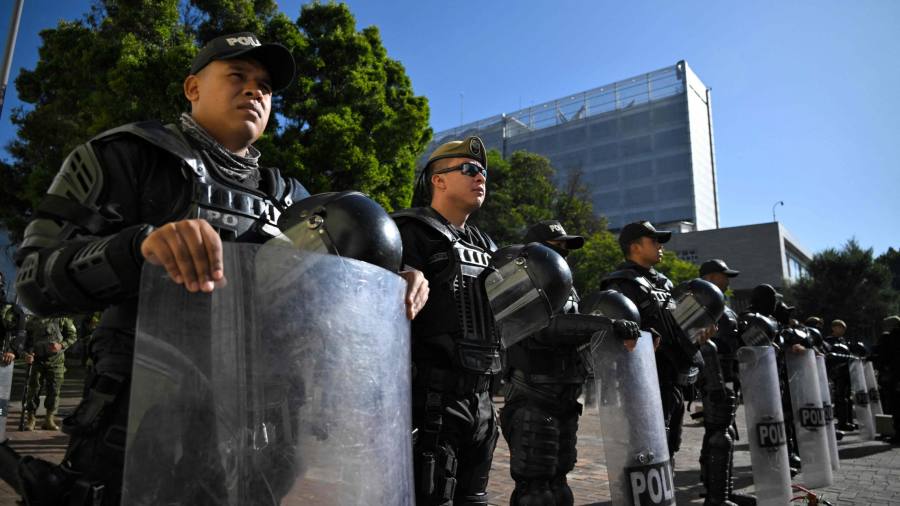Ecuador’s president Guillermo Lasso has taken the unprecedented step of activating a “mutual death” clause to dissolve congress and trigger snap elections after facing impeachment charges.
Lasso will have up to six months to rule by decree, overseen by the country’s constitutional court, after announcing the move on Wednesday in a televised address. Legislative and presidential elections will be convened in the Andean nation during that time.
“This is a democratic decision, not only because it is constitutional, but because it returns the power to the Ecuadorean people,” Lasso said. “As of today, the government will issue a series of decrees of laws that comply with the express mandate of the people.”
Lasso’s move to activate the constitutional clause known as mutual death, which has been in the country’s constitution since 2008 but has never been used, comes at a time of heightened turmoil in Ecuador.
Lasso — a former banker and one of Latin America’s few market-friendly presidents — triggered the clause a day after he appeared before the opposition-controlled congress where he is facing an impeachment trial for alleged embezzlement.
The president vehemently denied the charges, which relate to contracts awarded in 2018 to state-owned oil transport company Flopec, three years before he took office.
At the hearing, Lasso blasted lawmakers as “anti-legislators” seeking to “take down the credibility of the presidency [and] that of democracy”.
A vote on Lasso’s removal had been expected to take place at the weekend, with a supermajority of 92 votes out of 137 required to secure his ouster.
The vote to bring the case to trial received a simple majority of 88 votes out of 116 present, but following internal elections held at the weekend, the opposition was confident it had the votes to remove the leader.
The effort to impeach Lasso was led by the Union For Hope (Unes), the political party led by leftist former president Rafael Correa, who governed from 2007 to 2017 and at present lives in Belgium to avoid imprisonment following his own corruption conviction.
“This is illegal,” Correa said in a tweet on Wednesday in response to Lasso’s decree. “In any case, this is a great chance to send Lasso, his government and his legislators-for-hire home.”
Lasso is expected to stand in the upcoming presidential election despite poor poll ratings. He would likely face stiff opposition from Correa’s allies, who have been emboldened by success in local elections that took place in February.
Lasso has struggled to govern since taking office two years ago, finding himself unable to overcome a hostile congress. He has also failed to contain a rise in drug-related violence, though he did receive plaudits for Ecuador’s Covid-19 vaccination campaign and a debt restructuring deal with China last year.
Leftist opposition lawmaker Mireya Pazmiño, one of the leaders of the impeachment process, said Lasso’s move on Wednesday was illegal. “We’re going to take judicial action,” she said.
Some lawmakers had planned to occupy the legislative palace in the event of Lasso activating the mutual death clause, though on Wednesday morning the complex was closed and guarded by police in riot gear. Military and police leaders gave statements on Wednesday in which they recognised the legitimacy of Lasso’s decree.
Markets were troubled by Lasso’s announcement, with the price of bonds due in 2035 falling from 37 cents on the dollar to 33 cents before recovering to about 35.5 cents.
Meanwhile, the powerful Conaie indigenous federation has threatened to resume protests that paralysed the country last summer.
“If the government makes the wrong decisions and provokes a social reaction . . . we will declare a national mobilisation,” Leonidas Iza, the anti-capitalist president of Conaie, said before Lasso dissolved congress. “We are going to be standing by.”
On Wednesday morning, a Conaie statement called Lasso’s government “a dictatorship” and said that “collective decisions” would be taken by a special council in the hours ahead.
Analysts see a grim prognosis for governability in the country of nearly 18mn.
“This will cause a tonne of instability,” said Sebastián Hurtado, head of the Quito-based political risk consultancy Prófitas. “There is a risk of a constitutional crisis where it is unsure which decision will stand, and constitutional crises in Ecuador are usually resolved through pressure on the streets.”
Read the full article here




